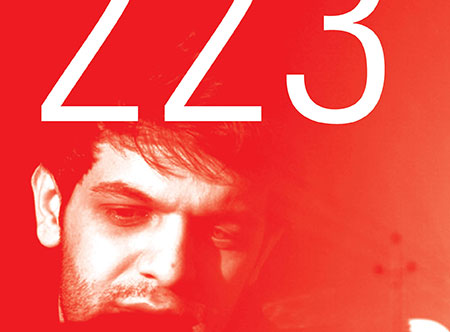223
As I write this, Keywam Karimi, an Iranian Kurd, has been condemned to six years in prison and 223 lashes. Six years. 223 lashes. One by one. 223. And what crime did Keywan Karimi commit to receive such savage punishment?
He made films. Keywan Karimi is, at 30, a young film director. He studied at Tehran University and has made mostly short films. They include the documentary Broken border(2012) which shows petrol smuggling taking place in the Zagros mountain range between Iran and Kurdistan. His best-known work, until present, is The adventures of a married couple, which opened at the 2013 Donostia Zinemaldia in the cinema school competition. Based on a short story by Italo Calvino, it is the story of a husband and wife who don’t talk to each other and live in a grey, noisy Tehran.
His latest film, Writing on the City, was shown for the first time at the Ikuspuntu film festival. A feature-length film, it starts by showing how the people who fought in the 1979 Islamic Revolution against the Sha spread their message around the streets of Tehran. And, nally, how the people who had reached power erased and forbade the political messages which they themselves had proclaimed in graf ti. Meanwhile, we are witnesses to Iranian society’s and politics’ “development” thanks to the messages written in graf ti over the years.
They punished Keywan Karimi because Writing on the City spreads decadent Western culture. When they took him to the police station, taking his laptop with them and erasing several hard disks; at the last moment the director managed to salvage a copy of Writing on the City. At present, Karimi is at home, waiting for his sentence to be appealed against. To denounce the case and express solidarity with Karimi, the festival which showed his lm for the first time has started work on a movie called 223 hitz (223 Words). In it, 223 international film directors and collectives have got together to demand his freedom. By the time this article is published, and now that Iran and the “Western Countries” have just signed an agreement, perhaps Karimi will be set free and will not receive any of the 223 lashes. Or perhaps his sentence will be reduced and he will get whipped a little less. It makes no difference. We cannot get used to (and we’re quite used to it already) the idea of freedom being “given” and sentences being reduced. The thing is, states and authorities punish creativity, culture and critics all the time. As a matter of course. And punishment takes the shape of violence, threats and economic measures. And, as we all know, there’s no need to go to Iran to come across all that.
He made films. Keywan Karimi is, at 30, a young film director. He studied at Tehran University and has made mostly short films. They include the documentary Broken border(2012) which shows petrol smuggling taking place in the Zagros mountain range between Iran and Kurdistan. His best-known work, until present, is The adventures of a married couple, which opened at the 2013 Donostia Zinemaldia in the cinema school competition. Based on a short story by Italo Calvino, it is the story of a husband and wife who don’t talk to each other and live in a grey, noisy Tehran.
His latest film, Writing on the City, was shown for the first time at the Ikuspuntu film festival. A feature-length film, it starts by showing how the people who fought in the 1979 Islamic Revolution against the Sha spread their message around the streets of Tehran. And, nally, how the people who had reached power erased and forbade the political messages which they themselves had proclaimed in graf ti. Meanwhile, we are witnesses to Iranian society’s and politics’ “development” thanks to the messages written in graf ti over the years.
They punished Keywan Karimi because Writing on the City spreads decadent Western culture. When they took him to the police station, taking his laptop with them and erasing several hard disks; at the last moment the director managed to salvage a copy of Writing on the City. At present, Karimi is at home, waiting for his sentence to be appealed against. To denounce the case and express solidarity with Karimi, the festival which showed his lm for the first time has started work on a movie called 223 hitz (223 Words). In it, 223 international film directors and collectives have got together to demand his freedom. By the time this article is published, and now that Iran and the “Western Countries” have just signed an agreement, perhaps Karimi will be set free and will not receive any of the 223 lashes. Or perhaps his sentence will be reduced and he will get whipped a little less. It makes no difference. We cannot get used to (and we’re quite used to it already) the idea of freedom being “given” and sentences being reduced. The thing is, states and authorities punish creativity, culture and critics all the time. As a matter of course. And punishment takes the shape of violence, threats and economic measures. And, as we all know, there’s no need to go to Iran to come across all that.



